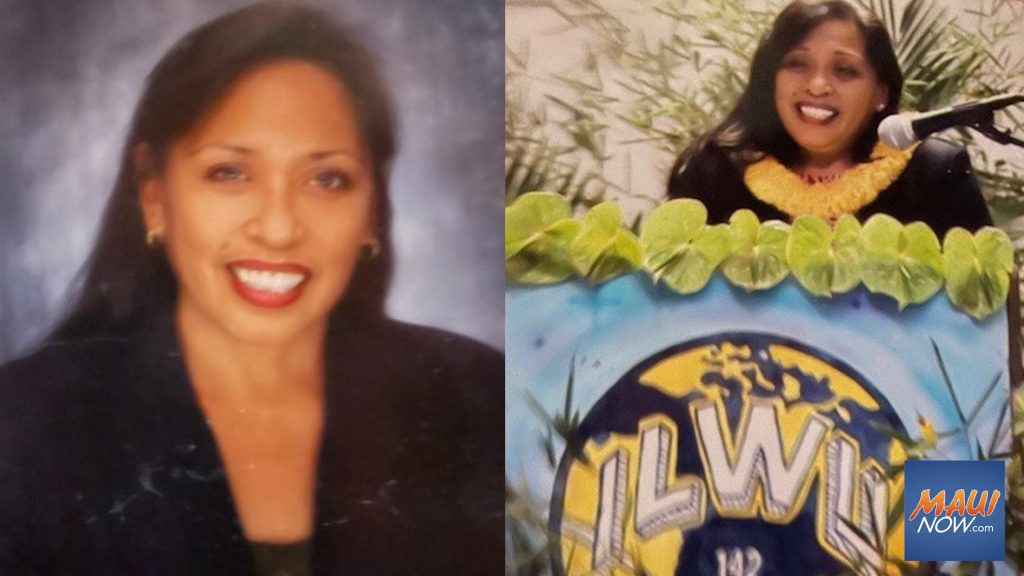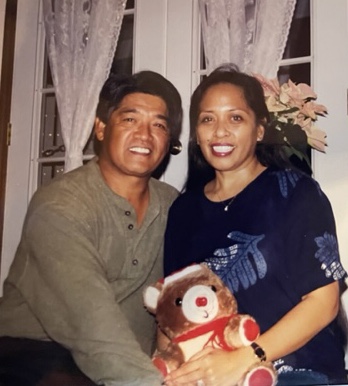From cashier to union president, Domingo reflects on Maui days, supporters

Maui Now: People Of Maui Interview
When Maui resident Donna Domingo started as a cashier at the Maui Lu in Kīhei in the late 1970s, she never thought that one day, she would rise to become the first female president of the Hawaiʻi ILWU Local 142 with 18,000 members statewide, then including longshoremen, hotel workers, and pineapple, sugar, and general trade employees. She talks about working within a labor union with a once overwhelming number of male members and adjusting and learning as she became a union volunteer, the scramble to help sugarcane and pineapple workers and retirees as the agricultural industries faded, and her own personal fight to keep her job as a front desk hotel clerk — a major lesson to her on how unions protect the rights of workers. She is credited with improving medical coverage for hotel workers during her 12 years as president and also using her influence to help to stop the eviction of some 250 tenants from Front Street Apartments in Lahaina in 2018. She retired in January, 2021. Maui Now writer Gary Kubota interviews her.
KUBOTA: Please tell me about you and your family?
DOMINGO: My parents came from immigrant families from the Philippines who worked on the plantations. My grandfather was a pineapple worker on Oʻahu and emigrated from the Illocos region in the 1940s. My husband’s grandfather, who also came from Illocos, was a sugar worker in Waimea on Kauaʻi Island. He retired from Waimea Plantation.
KUBOTA: Where were you raised in your early years?
DOMINGO: I was born and raised in Windward Oʻahu, mainly in Kāneʻohe. My parents had eight children, and my dad Benjamin Castillon was always working. He’d work as a mason Monday through Friday, then on weekends, he’d go fishing or work at his small farm, raising a couple pigs, cows and some chickens. When all the children were in school, my mother got a job working as a pineapple trimmer at Dole Cannery in Honolulu. Later, she took classes and became a real estate agent. They were always striving, striving to do better. Looking back, we always had food on our table, and we never went hungry.
KUBOTA: How did you get to Maui?
DOMINGO: We left Oʻahu in my senior year at Castle High School. About two to three months before my graduation, my father decided to move our family to Maui. He was working so much on Maui. He had been working as a mason at Hawaiian Dredging Construction and saw an opportunity to start his own contracting business in mason services. I ended up graduating from Baldwin High School. My father did well. He and my mother Lolita showed a lot of courage in making this change, and I learned from that. After graduation, I worked at Shirley’s Drive In in Kahului and took classes in hotel management at Maui Community College for two years. That’s how I got the job at the Maui Lu Resort. My husband Sylvester and I moved to Kīhei and happened to attend a dinner at the Maui Lu, and I enjoyed the friendly family atmosphere, and applied for a job.
KUBOTA: Wasn’t that the first hotel in South Maui?
DOMINGO: Yes. The Maui Lu was the best. Canadian Gordon Gibson built the resort, and the snow birds from Canada loved it. Jesse Nakoʻoka entertained at the hotel’s Long House. I started out as a cashier, and when someone retired, I moved over to become a front desk clerk.
KUBOTA: I’ve heard you kind of had a life changing experience after Gibson sold the hotel?
DOMINGO: The new owners brought in a new manager who came from Europe and had his own style of management. One day, he asked me for a pencil, and I gave him a pen, because we didn’t have any pencils at the front desk. He tossed the pen away and told me to go home. I was shocked. I guess my father taught us well. He used to say, when things like this happen, step back and don’t quarrel or get into an argument. The manager wouldn’t let me use the hotel phone, so I used a pay phone and called my ILWU business agent John Arisumi. John came quickly and told me to wait in the hotel. He spoke to the manager. There was screaming. But at the end of the day, I apologized, and I was able to return to work Monday. If there was no union, I would have been gone.
KUBOTA: Did things return to normal?
DOMINGO: Yes. It took a few months. A couple of months after incident, John asked if I could attend a union meeting, and because of our relationship and what he had done for me, I went.
KUBOTA: Then what happened?
DOMINGO: The next day after the union meeting, he asked me, “How did I like the meeting?” I said it was very interesting. Then, he said why don’t you just do this — he suggested I be the volunteer secretary-treasurer of the Maui Lu unit. The meetings were once a month, and I got a flavor of union operations and met fellow employees outside of work. Later, he said why don’t I run for vice chair of the unit… then he asked that I run for the chair… [and also] be on one of the negotiating committees. By the mid-1990s, we were going through some really tough negotiations but we got through it. I found something I really liked and was passionate about. It took me six to seven years to generally learn about union process while helping them organize at the same time.
KUBOTA: So John was grooming you?
DOMINGO: Hindsight, I guess so. He encouraged me, and I enjoyed the work of helping fellow workers. I was very, very active in a lot of volunteer organizing drives for decades and took a lot of classes offered by the ILWU in leadership, labor law and organizing. There were specific classes on how to be a shop steward, and how to mobilize union members into action.
KUBOTA: I hear you like baking?
DOMINGO: I love baking. At meetings, the union would provide their own lunches and dinners. But I’d bring snacks. I’d bake cakes and cookies for meetings — 7Up cakes, peanut butter, chocolate chip. You’d need something during long meetings. It was local-style meetings where you bring something. Even when I was at meetings on Oʻahu, I’d buy something to bring to the meeting, like two dozen manapuas. I learned the members may forget some details in a meeting but they remembered the dessert.
KUBOTA: When did you decide to run for a statewide office?
DOMINGO: I thought about running for office in 2000, but it felt like it was a man’s world. It would be like running against a brother. I didn’t like the idea of running against someone who was already in an ILWU statewide office. But attitudes were changing and the composition of our membership was changing too with the ILWU adding more members from hotels. Women like myself were becoming ILWU members. We had a kind of comraderie or relationship with each other and a passion for improving labor conditions. That inspired me. Then, in 2003, ILWU president Bobo Lapenia was retiring. Vice President Bobby Gerard was retiring too. I was in my 40s. I was also the only candidate running for vice president of the ILWU Local 142 out of Maui.
KUBOTA: How did serving as vice president go?
DOMINGO: My job as vice president was to support the president and improve the operations of the ILWU. I had to develop a lot of skills administering and helping to negotiate contracts. One of my major tasks was to computerize union operations so that we could track and follow 173 individual union contracts.
KUBOTA: I see you continued running as vice president and Isaac Fiesta ran and was elected president.
DOMINGO: Yes, that was in the 2009 election. I felt I wasn’t ready to run for president and needed to complete the work I started as vice president. Then Isaac became ill and left his term in 2011. I became the acting president.
KUBOTA: I guess that put you in a strong position as Fiesta’s permanent replacement?
DOMINGO: Yes. I ran for president in 2012, already having experience of working as a president, and I won the election.
KUBOTA: Did family members support you running for union office?

DOMINGO: They were great. During a family meeting, I asked for their blessing in running for office, and they gave it to me. I know that usually family comes first. But once you’re president, the union comes first because so many lives are affected by it. What the ILWU does can also influence business and government policies. My husband Sylvester works as a bartender in Wailea and understood the importance of having a strong union. Family members understood as well. They held signs on the sidewalks going into Wailea, supporting my election during my run for union office. It felt good having their support.
KUBOTA: Name one of your accomplishments during your presidency that gave you the most satisfaction?
DOMINGO: One of the things I accomplished as vice president was streamlining operations and taking our union information into the computer age. Before then, we were running on paper, pens and typewriters. With the transition to computers, we were able to compare terms in contracts, reduce conflicts in negotiations, and speed up contract settlements.
I also helped improve the medical plan for Hawaiʻi Local 142 hotel members through our Health and Welfare Trust Fund. It’s self-funded and requires no paycheck contribution. We started out with two hotels and we’re at 10 hotels and 4,000 members now.
KUBOTA: What was the most difficult time for you?

DOMINGO: It was helping to oversee the closure of Hawaiian Commercial & Sugar on Maui at the end of 2016. I knew a lot of the workers, many of whom were Filipinos and Hawaiians. The workers were among the highest paid agricultural workers in the state. We were fortunate that unemployment was low, and the hotels were willing to train new hires. A lot of them were hired. The transitional talks with the company took about a year. There were so many who helped, including business agents Joe Aquino and Robert Andrion and division director Stephen Castro, and ILWU social worker Joanne Kealoha. The company also provided extended medical coverage.
KUBOTA: I hear that shortly after your election as vice president that you met ILWU labor leader A.Q. McElrath?
DOMINGO: Yes, she visited me in my office in the ILWU building to congratulate me. She was retired as the union’s social worker, having been an organizer herself since the 1940s, but she’s still very active in public speaking. We had many face-to-face chats where she would share information with me and other ILWU leaders, information that was valuable to understanding the relationship and history of the ILWU longshoremen and sugar workers in Hawaiʻi and on the West Coast. If she needed me or wanted to share something or I wanted some background, we had a chat.
KUBOTA: What did you talk about?
DOMINGO: Some people don’t realize some of the rights we take for granted today came as a result of broad support, including help from labor unions in Hawaiʻi — racial equality, civil rights, and health care. She could talk about how the unions fought for these rights.
KUBOTA: I guess there was a time in the early 1900s when major Hawaiʻi sugar plantations pitted various ethnic immigrant groups like the Filipinos and Japanese against each other in an attempt to break sugar strikes.
DOMINGO: Yes. The ILWU succeeded in its strikes in Hawaiʻi in the 1940s because it organized across ethnic lines to create alliances. A.Q. McElrath reminded us of our union’s history. She had a memory of the historic value of things and put things into context. She had deep roots in the community and feelings about social justice and the right thing to do.
KUBOTA: What about the hotel workers strike at Kāʻanapali Beach Hotel and the Royal Lahaina on Maui? Wasn’t it one of the longest hotel strikes in Hawaiʻi history. According to newspaper accounts, the strike lasted for 76 days before there was a settlement.
DOMINGO: Of course, I wasn’t there at the time. Edwina Smythe, who was the unit chair at the Kāʻanapali Beach Hotel reminded us of times when workers’ wages and benefits were not the same as Honolulu. She was feisty and would always bring us back to the 1970s and the reason why we have unions. In the 1970s, hotels on Maui, the Big Island and Kauaʻi had their own strike. The settlement allowed the average wages to be raised by 9% in the first year. One of the reasons for the strike was to establish a five-day work week. Another was to limit split shifts to the food and beverage department. Our concern is and continues to be the health and safety of our members.
KUBOTA: Health and safety in what way?
DOMINGO: For instance, the hotels historically have pushed for maids to clean a higher number of rooms per day, and we have kept the numbers below those numbers, because injuries can occur when they are rushing to meet their quota.
KUBOTA: I know your union weathered the difficulties faced by the hotel industry during COVID. The unions including the ILWU were critical of the American Hotel & Lodging Association’s proposal for dealing with the pandemic. Thoughts?
DOMINGO: We were concerned that hotels might use COVID as an excuse to eliminate positions. We wanted to make sure decisions went in the direction of using a workforce trained and educated to help slow the spread of COVID. The goal was to keep the hotels properly cleaned and disinfected to create a healthy environment.
KUBOTA: Guy Fujimura, then the ILWU secretary who worked under you, says you’re too modest when it comes describing your work helping to weather the Covid pandemic and keep health coverage and benefits to temporarily laid-off workers. During the pandemic from March 2020 to February 2021, health coverage was extended to ILWU members?
DOMINGO: Yes, it ended in February, 2021 only when the American Cares Act required coverage through September 2021. I helped to negotiate a memorandum of understanding that protected their return to work and vacation and sick leave credits.
KUBOTA: It was close to the 11th hour for the Front Street Apartment tenants in Lahaina facing an eviction. Your union’s support helped to make a difference.
DOMINGO: We had members and their families living there. I called my executive staff to get the Maui County Council resolution moving.
KUBOTA: Yes. The council passed the resolution unanimously to seek state support to stop the eviction. The resolution was supported by Maui Mayor Alan Arakawa in his address to the state Legislature. That helped to start the ball rolling. The AFL-CIO Unite Here and Democratic Party of Oʻahu supported it along with Oʻahu churches and community organizations, and the Legislature passed a bill halting the eviction in 2018.
DOMINGO: The timing was good because it was an election year, and in the end, something needed to be done.
KUBOTA: What lies ahead for you?
DOMINGO: I’ve served as a volunteer on the county planning commission and the Liquor Board Adjudication Commission. I still have a passion for serving my community. I’ve been taking it easy since retiring but will be getting back to helping the community in some way.
Interviewer Gary Kubota has received several national awards in journalism and written a national touring play, Legend Of Koʻolau. His book “Hawaii Stories of Change: The Kokua Hawaii Oral History Project” is in the permanent collection at the University Of Hawaiʻi’s Department of Ethnic Studies’ Center for Oral History.







